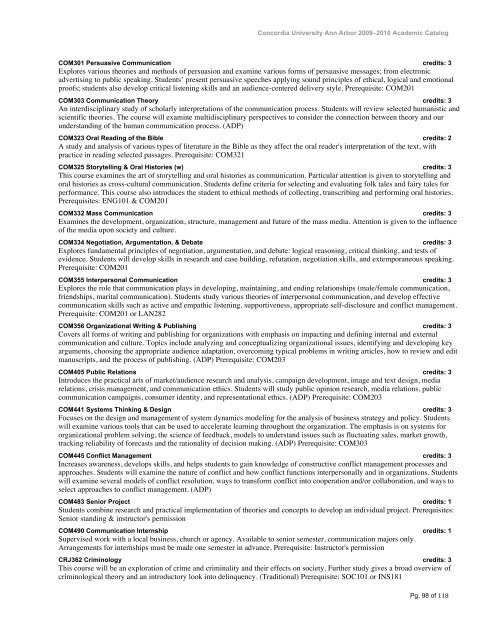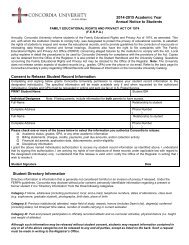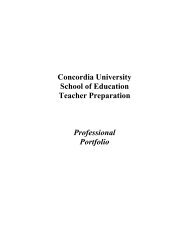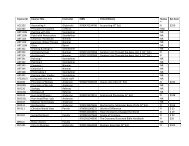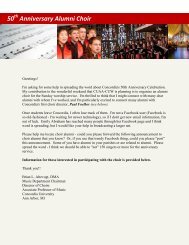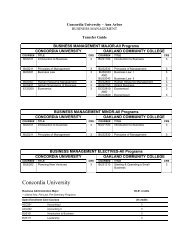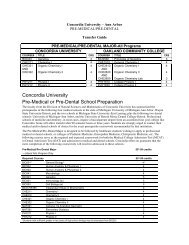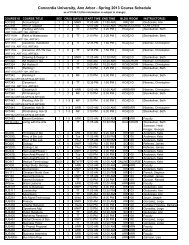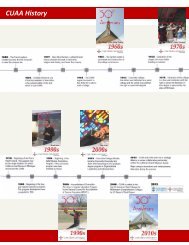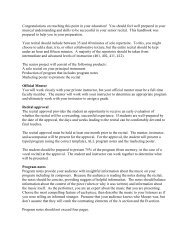2009â2010 Academic Catalog - Concordia University Ann Arbor
2009â2010 Academic Catalog - Concordia University Ann Arbor
2009â2010 Academic Catalog - Concordia University Ann Arbor
You also want an ePaper? Increase the reach of your titles
YUMPU automatically turns print PDFs into web optimized ePapers that Google loves.
<strong>Concordia</strong> <strong>University</strong> <strong>Ann</strong> <strong>Arbor</strong> 2009–2010 <strong>Academic</strong> <strong>Catalog</strong><br />
COM301 Persuasive Communication credits: 3<br />
Explores various theories and methods of persuasion and examine various forms of persuasive messages: from electronic<br />
advertising to public speaking. Students’ present persuasive speeches applying sound principles of ethical, logical and emotional<br />
proofs; students also develop critical listening skills and an audience-centered delivery style. Prerequisite: COM201<br />
COM303 Communication Theory credits: 3<br />
An interdisciplinary study of scholarly interpretations of the communication process. Students will review selected humanistic and<br />
scientific theories. The course will examine multidisciplinary perspectives to consider the connection between theory and our<br />
understanding of the human communication process. (ADP)<br />
COM323 Oral Reading of the Bible credits: 2<br />
A study and analysis of various types of literature in the Bible as they affect the oral reader's interpretation of the text, with<br />
practice in reading selected passages. Prerequisite: COM321<br />
COM325 Storytelling & Oral Histories (w) credits: 3<br />
This course examines the art of storytelling and oral histories as communication. Particular attention is given to storytelling and<br />
oral histories as cross-cultural communication. Students define criteria for selecting and evaluating folk tales and fairy tales for<br />
performance. This course also introduces the student to ethical methods of collecting, transcribing and performing oral histories.<br />
Prerequisites: ENG101 & COM201<br />
COM332 Mass Communication credits: 3<br />
Examines the development, organization, structure, management and future of the mass media. Attention is given to the influence<br />
of the media upon society and culture.<br />
COM334 Negotiation, Argumentation, & Debate credits: 3<br />
Explores fundamental principles of negotiation, argumentation, and debate: logical reasoning, critical thinking, and tests of<br />
evidence. Students will develop skills in research and case building, refutation, negotiation skills, and extemporaneous speaking.<br />
Prerequisite: COM201<br />
COM355 Interpersonal Communication credits: 3<br />
Explores the role that communication plays in developing, maintaining, and ending relationships (male/female communication,<br />
friendships, marital communication). Students study various theories of interpersonal communication, and develop effective<br />
communication skills such as active and empathic listening, supportiveness, appropriate self-disclosure and conflict management.<br />
Prerequisite: COM201 or LAN282<br />
COM356 Organizational Writing & Publishing credits: 3<br />
Covers all forms of writing and publishing for organizations with emphasis on impacting and defining internal and external<br />
communication and culture. Topics include analyzing and conceptualizing organizational issues, identifying and developing key<br />
arguments, choosing the appropriate audience adaptation, overcoming typical problems in writing articles, how to review and edit<br />
manuscripts, and the process of publishing. (ADP) Prerequisite: COM203<br />
COM405 Public Relations credits: 3<br />
Introduces the practical arts of market/audience research and analysis, campaign development, image and text design, media<br />
relations, crisis management, and communication ethics. Students will study public opinion research, media relations, public<br />
communication campaigns, consumer identity, and representational ethics. (ADP) Prerequisite: COM203<br />
COM441 Systems Thinking & Design credits: 3<br />
Focuses on the design and management of system dynamics modeling for the analysis of business strategy and policy. Students<br />
will examine various tools that can be used to accelerate learning throughout the organization. The emphasis is on systems for<br />
organizational problem solving, the science of feedback, models to understand issues such as fluctuating sales, market growth,<br />
tracking reliability of forecasts and the rationality of decision making. (ADP) Prerequisite: COM303<br />
COM445 Conflict Management credits: 3<br />
Increases awareness, develops skills, and helps students to gain knowledge of constructive conflict management processes and<br />
approaches. Students will examine the nature of conflict and how conflict functions interpersonally and in organizations. Students<br />
will examine several models of conflict resolution, ways to transform conflict into cooperation and/or collaboration, and ways to<br />
select approaches to conflict management. (ADP)<br />
COM483 Senior Project credits: 1<br />
Students combine research and practical implementation of theories and concepts to develop an individual project. Prerequisites:<br />
Senior standing & instructor's permission<br />
COM490 Communication Internship credits: 1<br />
Supervised work with a local business, church or agency. Available to senior semester, communication majors only.<br />
Arrangements for internships must be made one semester in advance. Prerequisite: Instructor's permission<br />
CRJ362 Criminology credits: 3<br />
This course will be an exploration of crime and criminality and their effects on society. Further study gives a broad overview of<br />
criminological theory and an introductory look into delinquency. (Traditional) Prerequisite: SOC101 or INS181<br />
Pg. 98 of 118


